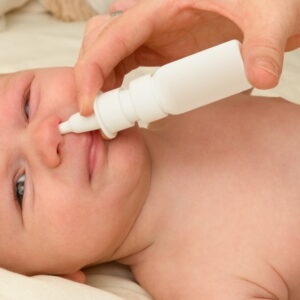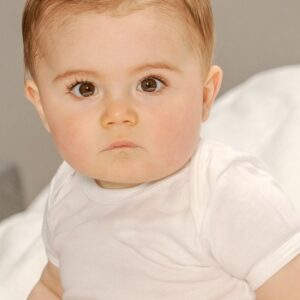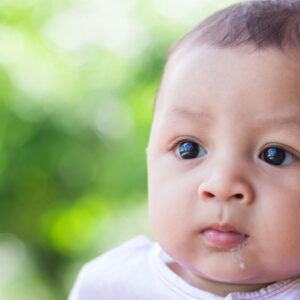A sick baby with a cold may refuse to eat or drink – and thereby risk dehydration. This situation is not uncommon. What can we do as parents? Read our doctor’s suggestion here.
Mom’s Question:
My son is 4 months old and has been sick for 5 days. Today he didn’t drink any milk, and I can tell trying was bothering his throat.
I give him Pedialyte, but I’m still worried. He has been sleeping all day, and when he is up one minute, he’s smiling, then the next, he is crying, and it’s back to sleep for him.
What is wrong with him? What can I do to help him, and how can I know if it is dangerous that he isn’t eating?
Sick Baby Not Eating: Causes and Treatments
In this article:
Why a Sick Baby May Lose Their Appetite
People tend to eat less when sick, whether babies, older kids, or even adults. A lot of studies have looked into why this happens, but because the body’s mechanism for controlling appetite is so complex, it’s still not 100 percent clear why our appetite decreases when we’re sick.
Recent research (reference below) has shown that humans, in general, might lose their appetite and eat less when they’re sick for two reasons:
- The body itself triggers fasting temporarily, or
- The infection (usually viruses) decreases the person’s appetite.
Note that the loss of appetite depends on a number of factors, such as the person’s age, type of illness, the specific infection involved, and how long the illness has been going on. Your doctor will know what to do best about your child’s food intake.
But, to conclude, it is normal for humans to want to eat less when ill.
Sore Throat and Not Eating – Possible Diagnoses
There are a lot of possible illnesses that decrease a baby’s appetite. Sharing other symptoms than a sore throat and not eating would make narrowing down the possible infections easier.
Nevertheless, let’s list some of the most common reasons a baby could get sick, have a sore throat, and lose appetite.
The Common Cold
If you or any household members just had colds within the last week, chances are your 4-month-old got it too. The common cold may be a mild infection, but it can easily pass from one person to another.
A cold is an infection due to viruses that get passed on from an infected person’s cough, sneeze, or unwashed hands. Some symptoms children may have are:
- Low-grade fever
- Colds
- Cough
- Sore throat
- Irritability or fussiness
- Decreased appetite
A respiratory infection like this may pull down your baby’s immune system and make him prone to other infections, like bronchiolitis or pneumonia.
Bronchiolitis / RSV
In bronchiolitis, viruses infect the smaller air passages found in the lungs, called bronchioles. This leads to swelling that can make it harder for air to pass through, making it harder to breathe properly.
Bronchiolitis is caused by viruses like respiratory syncytial virus (RSV) and influenza, which your baby could have gotten from the mucus or saliva of another infected person. Look for:
- Colds
- Cough
- Wheezing
- Fever
- Difficulty breathing or fast breathing
- The skin turns blueish due to a lack of oxygen
Because infants with bronchiolitis need to increase their effort to breathe properly, this becomes their priority rather than focusing on other things, like eating and drinking milk. RSV can make a baby younger than 12 months very ill. Additional signs that a baby is severely infected by RSV are:
- Short, shallow, and rapid breathing
- Difficulty breathing — you can see the chest muscles and skin pull inward with each breath
- Poor feeding
- Unusual tiredness (lethargy)
- Irritability
The baby must be taken to a doctor if a severe RSV infection or bronchiolitis is suspected.
Pneumonia
In pneumonia, your child’s lung tissue has been infected, usually by bacteria. Viruses (including RSV) and fungi can also cause pneumonia. The lungs can be infected from previous flu or upper respiratory tract infection that doesn’t completely resolve.
This illness is easily passed on from one person to another through airborne particles, like in coughing or contaminated skin surfaces of hands.
Kids with pneumonia may have these signs and symptoms:
- Fever
- Cough
- Fast or labored breathing
- Chest indrawing
A doctor may request some laboratory or imaging tests, like a chest x-ray, depending on certain factors, such as how severe your child’s symptoms are.
Like bronchiolitis, kids increase their breathing efforts, making it uncomfortable or unappetizing for them to eat or drink.
What to Do When a Sick Baby Doesn’t Eat and Drink
Avoiding Dehydration
First, make sure to have your child treated properly for his sickness. Because he’s so young, it’s better to have him seen by a doctor.
Depending on his illness, the lack of appetite may simply be part of the illness and is unavoidable. Usually, children start to eat again when they’re feeling better.
At this point, little signs of emotional support, like cuddling and playing with your child (if he’s in the mood), help lessen his discomfort and place him at ease while recovering.
One important thing to watch out for in babies who aren’t eating well is dehydration. Keep offering him fluids as often as possible without turning the situation into an unpleasant power struggle. This can include breast milk (if you are breastfeeding) or oral rehydration solutions. Do not offer your baby large amounts of water, as this can lead to water intoxication.
It is very important that he doesn’t get dehydrated. A sip from a bottle or a teaspoon of milk or rehydration solution every five minutes will make a huge difference compared to drinking nothing. It is often a lot easier to get a sick baby to drink frequent, small amounts than larger amounts.
If he continues to refuse to drink and starts showing signs of dehydration (specified below), you need to take him to a doctor immediately.
How Can I Tell if My Baby is Dehydrated?
Watch out for these telltale signs of dehydration:
- Less than 6 wet diapers in a day
- Urine that looks darker than usual or smells stronger than usual
- Lethargy (less playful and active)
- A dry, parched mouth and dry or cracked lips
- A sunken soft spot (fontanel) in the head
- Few tears while crying
- Decreased bowel movements
Signs That Your Baby May Be Seriously Dehydrated
If your child has any of these symptoms, bring him straight to the emergency room:
- Urinated only once or twice throughout the whole day
- Sunken eyes
- Hands and feet that feel cold and look splotchy or discolored
- Excessive sleepiness or fussiness
- Frequent vomiting or loose, watery stools
Treating Other Symptoms
You can use saline nasal drops to help your baby with his clogged nose. To avoid contamination with bacteria or other organisms, purchase infant nasal drops at the nearest pharmacy. Place one to two drops in each nostril, then give it a few seconds before gently removing any nasal discharge with a 1-ounce rubber syringe (suction bulb). You can do this before each feeding and bedtime to make breathing easier for your child.
To help both fever and any signs of throat discomfort, you can give him acetaminophen (commonly known as Infants’ Tylenol) every 4 hours on an as-needed basis. This means you can stop giving acetaminophen when he has no fever.
When to See a Doctor
If it seems your baby’s symptoms aren’t improving or getting worse, you should take him to a doctor. If, for example, the fever is getting higher, it might mean that he has a bacterial infection and will need antibiotics. Although colds from viruses can last up to a week, there is still a high chance that your child may have a bacterial infection.
Also, as mentioned above, if your baby shows signs of dehydration, you must take him to a doctor immediately. He might need to be given fluids through an IV line, especially if he doesn’t want to take anything at all.
Lastly, if you feel unsure or worried about your baby, having him checked by a healthcare professional would be better rather than a “wait and see” approach. After all, he’s just 4 months old.
I hope your little one feels better soon.
Paula
More Q&As About Sick Babies That Won’t Eat
Research References
- Gabriella Aviello, Claudia Cristiano, Simon M. Luckman, Giuseppe D’Agostino, Brain control of appetite during sickness First published: 05 July 2020
- Schütz P, Bally M, Stanga Z, Keller U. Loss of appetite in acutely ill medical inpatients: physiological response or therapeutic target?. Swiss Med Wkly 2014 Apr. 20
- Pneumonia in Children
- Children and Colds – HealthyChildren.org
Add your comments below.

Paula Dennholt founded Easy Baby Life in 2006 and has been a passionate parenting and pregnancy writer since then. Her parenting approach and writing are based on studies in cognitive-behavioral models and therapy for children and her experience as a mother and stepmother. Life as a parent has convinced her of how crucial it is to put relationships before rules. She strongly believes in positive parenting and a science-based approach.
Paula cooperates with a team of pediatricians who assist in reviewing and writing articles.







my baby is 10 months old, and has less urination in summer. is it normal or abnormal? he used to urinate 6 or more in a day.